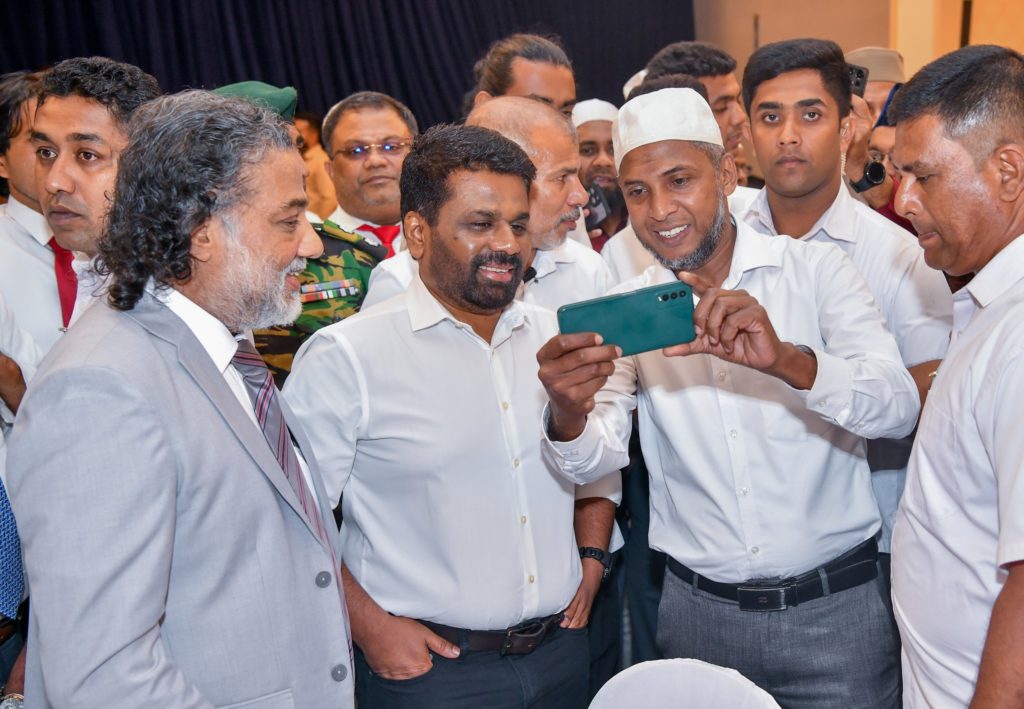-By the Lanka-e-News Political Desk

(Lanka-e-News -06.June.2025, 10.20 PM) In the inaugural edition of our new Lanka e-News Political Debate series—where we tackle raw, relevant, and at times uncomfortable political questions of the day—we dive headfirst into a growing controversy whispered across tea shops, mosques, WhatsApp groups, and political circles: why hasn’t the National People’s Power (NPP) appointed a single Muslim Cabinet Minister?
It’s a question that refuses to disappear.
After all, the numbers speak for themselves. During both the presidential and parliamentary elections, over 65% of Sri Lankan Muslims voted for Anura Kumara Dissanayake—a stunning endorsement from a community often cautious about national movements. In some districts, support for the NPP among Muslim voters remained above 60%, despite the party's secular, non-ethnic platform. That’s no small feat in a country where voting often follows ethnic and religious lines more rigidly than party manifestos.
Yet, despite this goodwill—and electoral muscle—the community has received zero representation at the cabinet level. Zero. Zilch. Not even a deputy post as consolation prize.
So the question emerges: Was this a strategic oversight? Or a philosophical choice by the NPP to reject identity-based appointments altogether? And if so, is that choice politically naive in Sri Lanka’s complex ethnic mosaic?
For decades, Sri Lankan Muslims have walked a delicate tightrope in national politics—often aligning pragmatically with both UNP and SLFP-led coalitions. But with the rise of the NPP, many in the community saw a rare chance: a break from clientelism, corruption, and communal tokenism.
This wasn’t just support. It was political trust.
And now, with that trust not yet rewarded with meaningful power, the community is beginning to ask: Has the NPP missed its moment?
To add salt to the wound, the government did indeed appoint a Tamil cabinet minister—not long after local elections. The irony? Tamil-majority districts overwhelmingly rejected the NPP at the ballot box.
So, the optics are murky. The NPP appears to be rewarding a community that didn’t vote for it, while overlooking the one that overwhelmingly did.
Now, before this becomes another round of identity-based finger-pointing, let’s be clear: this isn’t a call for sectarian politics. But inclusion matters. Symbolism matters. Recognition matters. Particularly in a country like Sri Lanka, still deeply marked by ethnic and religious wounds.
And here's the nuance: Muslims in Sri Lanka are not geographically concentrated like the Tamils in the North and East. They are spread across every province, every electorate—urban, rural, coastal, and hill country. That very diffusion makes them both integrated and politically invisible, depending on the lens used.
The NPP prides itself on non-sectarian, class-based politics. In fact, the party has consistently avoided carving its platform along religious or ethnic lines, claiming instead to offer a unified Sri Lankan vision that cuts through communal identity.
This is noble in theory. But as one senior Muslim community leader recently quipped, “In Sri Lanka, even the potholes know your ethnicity.”
You cannot build a government in this country without recognising the reality of our diversity. Non-racial rhetoric can easily become non-representative rule if it fails to translate into inclusive leadership.
Beyond domestic politics, there’s an emerging external cost. Several Arab diplomats in Colombo have reportedly raised eyebrows. “A government backed by Muslims but without a single Muslim voice?” said one Middle Eastern envoy off the record. “That’s hard to explain to our capitals.”
This perception—however misplaced—has traction.
While it’s clear the NPP didn’t deliberately exclude Muslims, perception and politics don’t always wait for a press release. At a time when Sri Lanka is keen to boost relations with the wider Islamic world—from oil diplomacy to migrant labour relations—symbolism matters more than ever.
The good news is: it’s not too late. The NPP has the political capital, popular mandate, and moral ground to correct course. Here are three no-nonsense suggestions:
Appoint a Muslim Cabinet Minister Immediately
There are competent, respected, and NPP-loyal Muslim MPs who can represent both policy and community without playing the communal card.
Launch an Internal Audit of Inclusion
If NPP is to be the party of the future, it must walk the talk on inclusivity—not just in numbers, but in narratives.
Engage with the Community Publicly
A direct, transparent conversation with Muslim community leaders would not just clarify intentions—it would rebuild trust and show political maturity.
Some within NPP circles might argue: “We don’t do identity politics. That’s what makes us different.” And yes, staying above ethnic horse-trading is admirable. But you cannot lead Sri Lanka by ignoring the very real emotional, cultural, and historical importance of communal identity.
What NPP must learn is this: inclusion doesn’t mean division. It means listening. It means reflecting the nation you claim to represent. It means giving a voice to the people who have already given you theirs.
So to President Anura Kumara Dissanayake and his advisors—consider this your wake-up call, respectfully delivered with the same passion with which your voters rallied behind you. Appointing a Muslim Cabinet Minister is not pandering. It’s political hygiene. It’s strategic common sense. And above all, it’s the right thing to do.
Let the buses run on time. Let the corruption end. Let the public sector flourish. But don’t forget the people who got you here.
Editor’s Note: The Lanka e-News Political Debate is a daily series raising unfiltered questions about policy, power, and representation. Tomorrow’s topic: “Is the IMF running Sri Lanka, or just managing the receipts?” Stay tuned.
-By the Lanka-e-News Political Desk
---------------------------
by (2025-06-06 16:54:43)
Leave a Reply